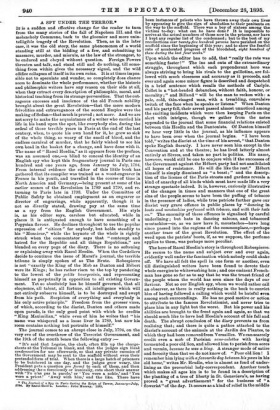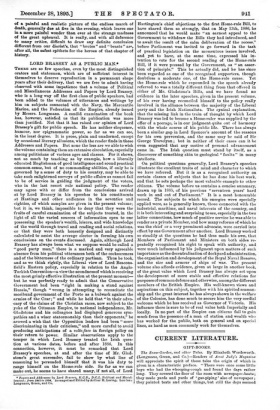A SPY UNDER THE TERROR.* IT is a sudden and
effective change for the reader to turn from the many stories of the fall of Napoleon III. and the melancholy Commune, back to the gloomier and more unin- telligible tragedy of the Revolution. Then, as in the later case, it was the old story, the same phenomenon of a world standing still at the bidding of a few, and submitting to massacre, murder, and misrule, as the law of the strongest, to be endured and obeyed without question. Foreign Powers threaten and talk, and stand still and do nothing, till some- thing from within gives the necessary signal, and the wild edifice collapses of itself in its own ruins. It is at times impos- Bible not to speculate and wonder, so completely does chance seem to dominate the whole performance, whether the historic and philosophic writers have any reason on their side at all, when they extract every description of philosophic, moral, and historical teaching from its strange perversities. That the out- rageous excesses and insolence of the old French nobility brought about the great Revolution—that the more modern frivolities and extravagances of the second Empire were the making of Sedan—that much is proved ; not more. And we are not sorry to make the acquaintance of a writer who carried his life in his hand upon the spot, like everybody else, during the ordeal of those terrible years in Paris at the end of the last century, when, to quote his own hand for it, he grew so sick of the whole thing, so weary of the smell of blood, and the endless carnival of murder, that he fairly wished to see his own head in the basket for a change, and have done with it. The name of "Raoul Hesdin," as it appears from the preface, was an assumed one,—a blind to conceal the identity of an English spy who kept this fragmentary journal in Paris one hundred and one years ago, from January to July, 1794. From internal evidence the editor of this little book has gathered that its compiler was trained as a wood-engraver in France in his youth, and travelled in the course of time North America and Germany,—being present at some of the earlier scenes of the Revolution in 1789 and 1790, and re- turning to Paris late in 1793. Under the Committee of Public Safety he obtained employment as an engraver or director of engravings, while apparently, though it is not so directly stated, drawing pay at the same time as a spy from the English Government. His style is, as his editor says, careless but educated, while in
places it is antiquated enough to have something of a Pepysian flavour. He declines throughout to use the popular expression of " citizen " for anybody, but holds steadily to his "Monsieur," while the keynote of the whole is rightly struck when the commentator says that "contempt and hatred for the Republic and all things Republican," are blended on every page of the diary. There is no softening or explaining away with Raoul Hesdin. When the Cordeliers decide to continue the issue of Marat's journal, the terrible tribune is simply spoken of as The Brute. Robespierre is not "exactly the King of the Mob as Danton and Hebert were its Kings ; he has rather risen to the top by pandering to the lowest of the petite bourgeoisie, and representing
himself as perpetually in opposition to all existing Govern- ment. Yet so absolutely has he himself governed, that all eloquence, all talent, all fortune, all intelligence which will not entirely subserve himself, is to be destroyed and swept from his path. Suspicion of everything and everybody is his only active principle." Freedom from the grosser vices, of which, according to the diarist, Danton and others made open parade, is the only good point with which he credits "King Maximilian," while even of him he writes that "his name was whispered as a loose liver in 1789, but now his room contains nothing but portraits of himself."
The journal comes to an abrupt close in July, 1794, on the very eve of the overthrow of the Terrorist Government, and the 19th of the month bears the following entry :—
" It's said that Legrise, the clerk, often fills up the charge- sheets at the Tribunal in blank, and that the judges sign blank condemnation for use afterwards, so that any private enemies of the Government may be sent to the scaffold without even their pretended form of trial. When there is a large batch of prisoners to be butchered in one day, and the judges grow weary, the President puts a question pro formd to each of them, and then addressing then ferociously or ironically, cuts short their answer with Tu n'as pas la parole,' or 'You were a noble,' and You were a priest." Away with him,' and the like. There have • The Journal of a Spy in Paris during tha Reign of Terror, January—July, 174. By Raoul Ilesd.n. London: John Murray. 1895. been instances of priests who have thrown away their own lives by appearing to give the sign of absolution to their penitents on the way to the scaffold. There was a boy of sixteen among the victims to-day : what can be have done P It is impossible to arrive at the actual numbers of those now in the prisons, nor have I kept any regular list of the condemned ; but to the best of my recollections over twenty-five hundred persons have perished on the scaffold since the beginning of this year; and to show the fearful rate of accelerated progress of the bloodshed, eight hundred of these during the last four weeks."
Upon which the editor has to add, that "really the rate was something faster ! " The ins and outs of the extraordinary struggle, throughout which each preponderant hero was always striving to bring his rivals to the guillotine, are fol- lowed with much closeness and accuracy as it proceeds, and ever and again some minor figure is described and despatched in a brief sentence which recalls the methods of Carlyle.
Collet is a " hot-headed debanchee, without faith, honour, or morality ; " and Billaud " will be the man to reckon with : a pale, cold, thin-visaged man, with a trembling, convulsive twitch of the face when he speaks or listens." When Danton and his party fell, their arrest passed almost unnoticed among the exciting incidents which were then keeping Paris on the alert with intrigue, though we gather from the notes appended to the journal that some financial relations existed between this Hesdin and the Dantonists. Of Danton himself we hear very little in the journal, as his influence appears
to have been over when the journal begins. "I have been told," writes the diarist at the time of his arrest, "that Danton spoke English fluently. I have never seen him except in the
Convention and at the theatre; he has lived latterly almost entirely at Sevres, and taken no part in politics. His name, however, would still be one to conjure with if the successes of the Government against the Hebert party had not annihilated all hopes of resistance. He will die like the rest." Hebert himself is simply dismissed as "a beast;" and the descrip- tion of the license of the Paris streets and gardens reveals a kind of anarchy of all kinds which must have made life a very strange spectacle indeed. It is, however, curiously illustrative of the changes in times and manners that one of the great sins of the people seems to have been the puffing of tobacco in the presence of ladies, while true patriots further gave our diarist very grave offence in public places by "dancing in boots and mustachios perfumed with tobacco, and with their hats on." The enormity of these offences is signalised by careful underlining ; but hats in dancing saloons, and tobaccoed mustachios—or, as we now have it, moustaches—have long since passed into the regions of the commonplace,—perhaps another trace of the great Revolution. The effect of the weed upon the patriots' boots, if, as we suppose, the perfume applies to them, was perhaps more peculiar.
The hero of Raoul Hesdin's story is throughout Robespierre. He recurs to the name and subject over and over again, evidently well under the fascination which nobody could shake off. We have all felt the spell in one form or another, even till distinguished writers have been found to devote their whole energies to whitewashing him ; and one eminent French- man has gone so far as to say that he was the truest friend of the people whom the world has seen since the days of our Saviour. Not so our English spy, whom we would rather call an observer, as there is really nothing in the book to convict
him of having followed a calling which would be hateful even among such surroundings. He has no good motive or action to attribute to the famous Revolutionist, and never tries to place him in any light but the worst. But his power and his
abilities are brought to the front again and again, so that we should much like to have had Hesdin's account of his fall and death. The abrupt conclusion of the diary prevents us from realising that; and there is quite a pathos attached to the diarist's account of the animals at the Jardin des Plantes, to
which they had been removed from Versailles. We can scarcely credit even a mob of Parisian sans-culottes with having tormented a poor old lion, and allowed him to perish from sores and vermin, because he was a king. A stranger mode of satire and ferocity than that we do not know of. "Poor old lion ! I remember him lying with a favourite dog between his paws in his old home," writes Mr. Hesdin, who is almost as fond of under-
lining as the proverbial lady-correspondent. Another touch which makes all ages kin is to be found in a description of the planting of a tree of liberty in St. Genevieva's, as having proved a "great advertisement" for the business of "a flowerist" of the day. It occurs as a kind of relief in the middle of a painful and realistic picture of the endless march of death, generally due at five in the evening, which leaves one in a more painful wonder than ever at the strange madness of the great upheaval. It is really, and with all deference to many critics, difficult to draw any definite conclusion different from our diarist's, that "brutes" and "beasts" are, after all, the safest epithets for the heroes of that chapter of history.



































 Previous page
Previous page